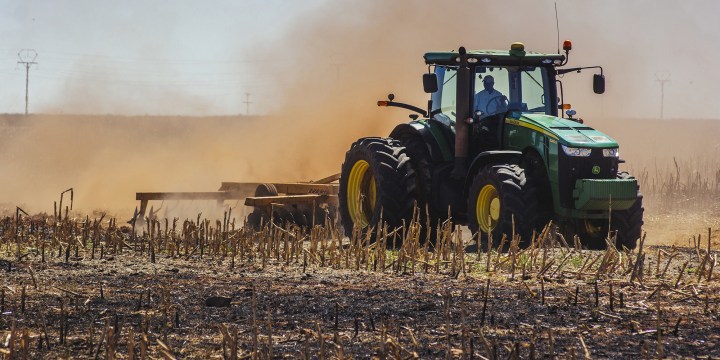FOOD JUSTICE: OP-ED
African faith communities: ‘Industrial agriculture is no solution for Africa’

Over 500 civil society, faith leaders and supporting organisations across Africa have signed an open letter to the Gates Foundation asking them to stop supporting the Alliance for Green Revolution in Africa’s industrial farming initiatives.
Francesca de Gasparis is Executive Director and Gabriel Manyangadze is Climate Justice Coordinator at the Southern African Faith Communities’ Environment Institute (Safcei).
The Alliance for Green Revolution in Africa (Agra) was founded in 2006 and has been funded to date by governments and major international donors such as the Bill and Melinda Gates Foundation to “transform African agriculture from a subsistence model to strong businesses that improve the livelihoods of the continent’s farming households.” However, data from the countries where Agra has focussed its efforts have seen continued poverty and a 30% rise in food insecurity.
To highlight the gravity of this issue and the level of concern in African civil society, faith leaders and supporting organisations across Africa, nearly 500 actors, signed an open letter to the Gates Foundation asking them to stop supporting Agra’s industrial farming initiatives. Our view is that we do not need farming ‘solutions’ but rather support locally appropriate solutions, working in partnership with small-scale farmers in ways that increase climate resilience.
As can be seen from the Agra’s approach, and other top-down approaches that have failed in Africa, such as United Nations Framework Convention on Climate Change campaign to reduce emissions from deforestation and forest degradation in developing countries (known as UNFCCC REDD+) and the World Bank’s Clean Development Mechanism, climate change is a complex issue and it will not be solved by a narrowly defined business-oriented approach that focuses on profit and investment returns.
Over the past 15 years, Agra has been working to restructure seed laws, so that corporate entities’ certified varieties are protected, while criminalising trade of non-certified seed. This is particularly problematic for small scale farmers in Africa, where 80% of non-certified seed and food come from millions of smallholder farmers who recycle, and exchange seeds each year. This “open-source knowledge bank” of seeds, that cost little to nothing, has all the nutritional value needed to sustain these communities.
Not only does the corporatisation of seed undermine existing indigenous knowledge systems regarding seed diversity and multi-cropping, but more insidiously, it centralises control of production systems, disempowering and reducing the resilience of small-scale farmers who rely on informal trade, historical and cultural knowledge in addition to their unique understanding of their ecological landscapes.
Around the globe, agribusinesses, driven by initiatives like Agra, have been trying to convince governments and financial institutions that they hold the answer to solve the world’s hunger problems through improved production. However, this concept has been debunked by food system research and a complete lack of success. The world does not have a food production problem, rather hunger is a result of inequality and lack of access.
The so-called “Green Revolution” has already failed in India where recent widespread farmer protests made it crystal clear that this approach does not work out fairly for small farmers. In Africa, smallholder farmers, oftentimes women, are indispensable to a nutritional and climate-resilient future.
Those funding Agra need to take stock of its failures to date, that farmers already know what they need to tackle climate change and shift funding from Agra to programmes that support their efforts to do so.
If the Gates Foundation really wants to transform poverty in Africa, they need to sit down and learn from small-scale farmers around the world, who have food systems that are socially just and ecologically sustainable. Their challenges include access to markets and other factors where assistance would make a difference.
We urge donor agencies and foundations to stop funding Agra and find ways to work with smallholder farmers to ensure that they have ample support and to assist governments in implementing holistic, supportive strategies. And, instead of giving ownership to multinational corporations, rather help ensure that local communities have a real stake to have their voices heard in policy negotiations. They need secure land tenure and the assurance that they have agency and power over their own circumstances for self-determination. DM/MC
Francesca de Gasparis is Executive Director and Gabriel Manyangadze is Climate Justice Coordinator at the Southern African Faith Communities’ Environment Institute (Safcei).
Safcei is a multi-faith organisation committed to supporting faith leaders and their communities in Southern Africa to increase awareness, understanding and action on issues of eco-justice, sustainable living, animal welfare, and climate change. Safcei may be best known for its role in successfully blocking the government’s unlawful and unconstitutional nuclear deal in court, in 2017. Safcei is also part of a global cage-free egg campaign.

















 Become an Insider
Become an Insider
What exactly do you mean by “locally appropriate solutions”?
So hunger is the result of “inequality and lack of access”…?? I am always interested by people’s statements of what “should” be done without actually saying HOW to do that.
And to add insult to injury you propose that Governments and foundations like the Gates Foundation should just hand over their money but not their advice.
I hope they tell you tell you to go jump…
I’m sure that the Gates Foundation would be more than willing to discuss ways of making African agriculture more environmentally friendly and sustainable as well as promoting the planting of heirloom seeds. It would be a matter of talking to the right people and that shouldn’t be difficult considering that the Foundation is run by a former South African.